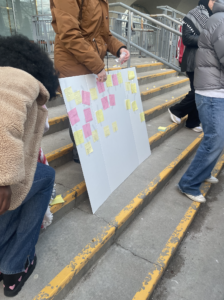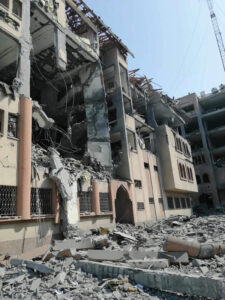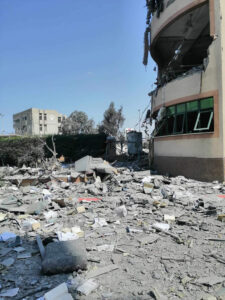On Dec. 2, Sofyan Taya, a guest scholar at UW in 2021, was killed by an Israeli airstrike in Jabaliya, just north of Gaza City. Taya’s wife and two adult children were also killed. Since their deaths, UW students and faculty have spoken about Taya’s legacy and called for the university to address his demise.

Earlier today, UW Voices for Palestine and the Indigenous Students Association held a vigil for Taya in the Arts Quad on campus. The vigil followed a statement signed by 16 UW student associations that called for the university to publish their own statement about Taya and condemn “intentional Israeli attacks on academic institutions,” among other demands.
Since Hamas’ Oct. 7 attack on Israel that killed 1,200 people, Israel’s counterattack has killed at least 17,487 Palestinians, according to the Gaza Health Ministry.
Those who attended today’s vigil held candles and wrote notes for Taya, which were collected and displayed on a board. Statements and comments from people who knew Taya — including his cousin and students Taya taught — were also read aloud during the vigil.
“I would have appreciated if [the UW administration] had acknowledged what happened to him — how he was targeted, and assassinated, and killed,” the statement from Taya’s cousin read.
In response to a request for comment, a university spokesperson said that the university is saddened by the death of Taya and has been in contact with those in the community who knew him well to offer support.
Taya moved to Canada in February 2021, after receiving a prestigious fellowship. He was asked to come to UW as a guest scholar, where he worked alongside several faculty members including Omar Ramahi, professor of electrical and computer engineering. The two co-authored 10 papers together.
A statement from Ramahi was also read aloud during the vigil. His statement detailed the friendship he developed with Taya when he arrived in Waterloo, which “was short-lived because of the genocidal campaign against the Palestinians of Gaza.”
Since Dec. 2, Ramahi has shared his memories of Taya, who he describes as having been “very nice, [a] gentle soul, very polite, [and] very industrious.” Ramahi said that many other community members including custodians and post-doctorates knew Taya, and that he left “very sweet memories,” ones that are “now very bitter, [due to] the fact that he was blown to pieces.”
Taya was appointed president of the Islamic University of Gaza (IUG), the largest university in Gaza, six months ago, and was ranked among the top two per cent of researchers globally for optics in 2021 and 2022 by Stanford University. He was also appointed UNESCO Chair for Physical and Astrophysical Sciences in Palestine.
Ramahi said that he had been in contact with Taya since Oct. 8 or 9, and that they had contact four or five days before he and his family were bombed.

He recalled that Taya said, “The situation here is very, very bad, pray for us.” Taya had sent him photos of the IUG reduced to rubble after it had been destroyed by Israeli airstrikes on Oct. 10, images that left Ramahi in disbelief. “[You’re] basically assassinating your future generations by bombing a university,” he said.
Ramahi said that the news of Taya and his family’s death was outrageous. “Our heart is devastated, not just for him … but when we remember how he ended up dying along with his family.” Ramahi explained how proud Taya was of his children, and how happily he would share about his daughter who had just finished dentistry school in Gaza and his son who had finished his medical degree in Sudan.

Ramahi urged for responses to the attacks on Palestine to not be politicized, stating that academic institutions should foster, not control, political debate, and that “[t]o call for a stop to a genocide has nothing to do with politics, and some people are struggling to understand this and I don’t know why.” He criticized UW’s statements referencing those of Jill Dunlop, Ontario’s minister of colleges and universities, who said that universities must recognize the consequences that can come with expressing one’s freedom of speech.
Ramahi critiqued Dunlop’s statement, saying, “I don’t believe there’s any limit to free speech … It’s a chilling statement, it’s meant to frighten us, to shut us up, to eliminate debate.” He advocated for a focus on the legality of statements as a benchmark for judging them, rather than one of personal alignment, stating, “[Illegal]’s the word we need to emphasize … You may not like what I say, [but] if you like everything that I say then you’re talking to the wrong person, then I’m not helping you in life.”
He reflected on the impact of Taya and his family’s death on the UW community, saying, “I think that it brought this tragedy closer to Waterloo, because of the people who’ve known him … In a strange way, that made us all be aware of this tragedy that has befallen the Palestinian people.”
With files from Alicia Wang.































